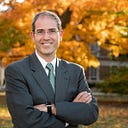
Responding to Complexity with Nuance and Grace
In the wake of last week’s violence, we have again become caught up in the fraught dichotomy into which public discourse always seems to force us. It is as if somehow the human capacity to hold complex thoughts consistently together dissolves the moment ideas enter the public sphere.
The heartbreaking killings of Philando Castile in Minnesota and Alton Sterling in Louisiana require us to face the pathological pattern of violence white police officers continue to perpetrate on fellow African American citizens even as we mourn and denounce the assassination of police officers in Dallas.
The situation, our situation today in the United States, demands something difficult of us. It requires us to come to terms with the long and abiding history of racism that was woven into the fabric of the American experience long before it was ratified and legitimized in the texts of our founding documents.
There is no short term solution for this endemic racism and injustice. But there is a longer, more difficult path on which we might embark that will, over time, enable us to create a more just and a more perfect union.
It is the path of a certain kind of education, a liberal arts education deeply attuned to the fraught and broken world we share yet committed to cultural engagement and social justice.
A culturally engaged liberal arts education facilitates the capacity of citizens to respond to complexity with nuance and grace, and it deepens our shared commitment to make the world a better, more just, place.
Nuance is vital, because it involves the ability to discern the texture of a situation, to recognize how history saturates the present, how the contours of experience and identity and interest intersect, playing themselves out in our interactions and through our institutions. Grace, however, it’s vital too, because it empowers us to navigate our relationships with one another elegantly, that is, in ways that affirm and honor the experiences of others so that we might begin to move together toward a justice broader and more enduring than our finite selves.
These capacities for nuance and grace, however, remain impotent unless they are enlivened by an intentional choice to weave a commitment to justice into our relationships with one another.
The sort of liberal arts education we are seeking to cultivate in the College of Arts & Letters at Michigan State University is grounded in the belief that our deepest divisions, our most enduring social and political challenges, can only be redressed by a citizenry capable of and committed to pursuing justice with nuance and grace.
Ours is a vision of the liberal arts endeavor deeply rooted in the University’s mission to transform the lives of our students and improve the life of our shared body politic.
To begin to put this vision of a culturally engaged liberal arts education animated by a commitment to justice into practice, we must redress our collective failure to educate a more diverse generation of faculty. This is why we have focused significant attention on graduate education, and specifically, on recruiting graduate students like Shenika Hankerson, who brings her rich understanding of cultural practices to her research in ways that cultivate an appreciation of and respect for difference.
An education in the liberal arts is an education in the art of the possible. In the wake of the events of the past week, in the wake of the long history of racism this country continues to endure, it is all too easy to remain pinned like butterflies, as James Baldwin put it.
The harder path is the longer road we embark upon whenever we take up the liberal arts endeavor and seek the justice that is possible despite the very real injustices we continue so poignantly to encounter.
